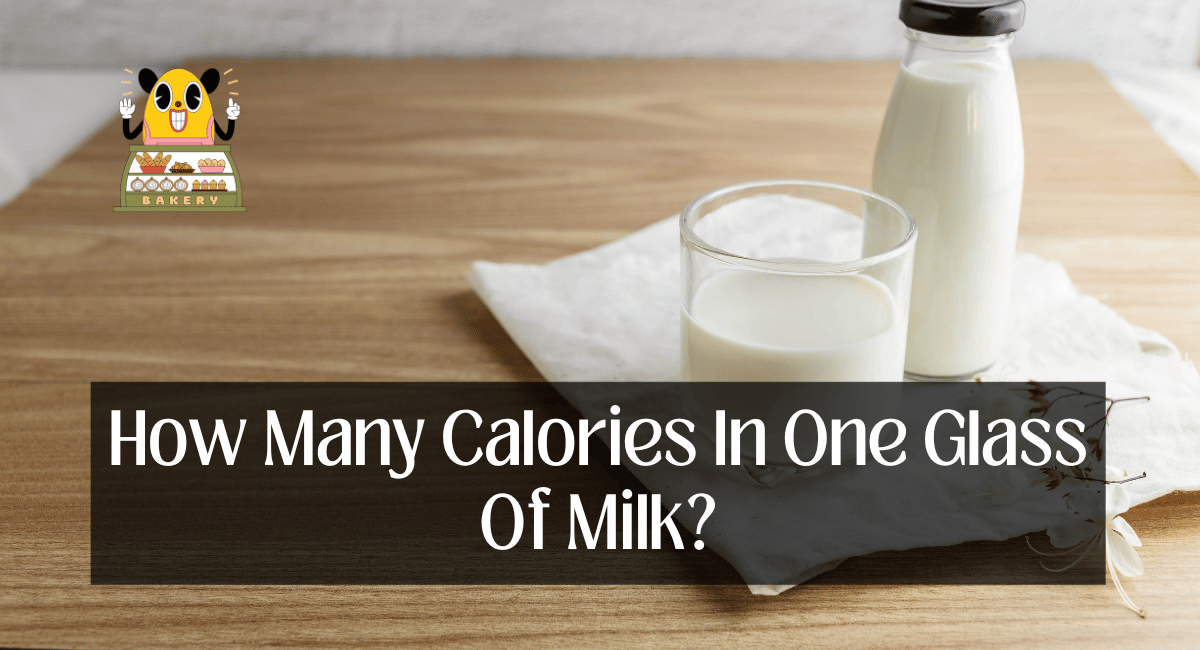Inquiring about the caloric composition of a common beverage such as milk illuminates our quest for nutritional information.
The number of calories in a single glass of milk might vary depending on factors such as fat percentage and serving size. The caloric contents of full milk, 2%, 1%, and skim milk differ, influencing our dietary selections.
This insight emphasizes the significance of educated consumption and understanding nutritional labels in order to make decisions that are in line with personal health goals. Let’s look at the calorie counts of several varieties of milk to better understand their functions in our daily meals.
How Many Calories In One Glass Of Milk?
1 glass of milk contains 122 calories and weighs around 244 g. Many people are sensitive to lactose, the natural sugar found in milk. However, drinking cow’s milk has various advantages.
It is a good source of lipids, carbohydrates, vitamins, proteins, and minerals, making it an excellent food for the body. A single glass of milk contains approximately 122 calories and contains the following nutrients.
How Many Calories Are In One Glass Of Milk As Per Milk Fat %?
Calories count can differ by the type of milk. Here’s a list of the many types of milk and their approximate calorie counts for a normal 8-ounce (240 ml) glass:
- Whole milk (3.25% fat) has around 150 calories per glass.
- 2% milk (2% fat) has about 120-130 calories per glass.
- 100 calories per glass of 1% milk (1% fat).
- Skim milk (0% fat) contains approximately 80-90 calories per glass.
Different Types Of Milk
Cow’s Milk: Milk obtained from cows is the variety of milk that is drank the most frequently. It has a high calcium content, as well as vitamin D and protein. The fat content of cow’s milk can be purchased in a number of different varieties, including whole milk (full fat), 2% milk, 1% milk, and skim milk (fat-free). Cow’s milk contains approximately 150-160 calories.
Goat’s Milk: The composition of goat’s milk is comparable to that of cow’s milk; however, the fat globules in goat’s milk are smaller, which makes it simpler to digest for some individuals. It also has a little reduced level of lactose. Goat’s milk might be more tolerable for individuals who are allergic to cow’s milk. It contains 168 calories per 1 cup.
Sheep’s Milk: In comparison to cow’s milk, Sheep’s milk has a higher fat and protein content than other foods and it also contain high calorie than cow’s milk, 265 calorie in per cup. It has a velvety texture and is frequently utilized in the production of artisan cheeses such as Roquefort and Pecorino.
Almond Milk: Almond milk is a dairy milk substitute that is prepared by blending ground almonds with water. It contains no cholesterol and only a few calories(30-40 calories) per serving. It is typically enriched with several vitamins and minerals, like calcium and vitamin D, among others.
Soy Milk: Soy milk, which is prepared by combining soaked soybeans with water, is another popular plant-based milk. It is feasible to supplement it with nutrients such as calcium and vitamin B12, and it is an excellent source of plant-based protein but it contains only 80 to 90 calories per serving.
Oat milk: Oats and water are the two main ingredients in oat milk. It has a naturally sweet taste and a smooth and velvety consistency. In many cases, it has been supplemented with various vitamins and minerals. It is an excellent source of dietary fiber but poor in calorie counts. It contains approximately 40 to 50 calorie.
Coconut Milk: The flesh of mature coconuts is grated and used to make milk made from coconuts. It has a flavor that is both rich and tropical, and it is frequently used in cooking. There are coconut milks that are more like beverages, and there are other coconut milks that are thicker and come in cans that are used in cooking. Coconut milk has an excellent amount of calories, it contains 445 to 552 calories.
Rice Milk: Milled rice and water are the two ingredients that go into making rice milk. In comparison to cow’s milk, it is naturally sweeter and has a consistency that is more runny. It is frequently enhanced with nutritional components such as calcium and vitamin D. It contains 70 to 90 calories in per serving.
Cashew Milk: Cashew milk is a creamy-textured plant-based milk made by mixing soaked cashew nuts with water. It has a high amount of healthy fats and the potential to be a good source of minerals like magnesium and zinc but in calorie count, it is not as good as other nutrients. It contain only 25 to 50 calories in per serving.
Hemp Milk: The two main ingredients in hemp milk are hemp seeds and water. It is an excellent source of omega-3 fatty acids as well as protein derived from plants but not rich in calorie count. It has only 70 to 80 calories.
Flax Milk: Flax milk is created by combining water and ground flax seeds. It contains 25 to 60 calories per serving. In addition to being a rich source of omega-3 fatty acids, other nutrients, such as calcium and vitamin D, are frequently added.
Quinoa Milk: Quinoa grains and water are the two main ingredients in quinoa milk. It does not include any gluten and offers a trace quantity of protein in addition to other nutrients. It also not rich in calorie count, it only contains 50 to 60 calories per serving.
Health Advantages Of Milk
The USDA suggests include dairy products in your diet. Milk and other dairy products give calcium, protein, and vitamin D, which are essential for strong bones and muscles. The USDA also suggests selecting dairy products with no added sugars or sweets and that are low in fat.
Increases Bone density
Calcium and vitamin D, which are present in milk and other dairy products, are needed for bone health and strength and may help prevent osteoporosis(a bone weakening condition that can lead to fractures).
Dairy consumption during childhood and adolescence has been linked to a lower incidence of osteoporosis later in life.
Lowers Hypertension Risk
A 2013 study of almost 3,000 women discovered a link between a lack of dairy consumption, osteoporosis, and hypertension, or high blood pressure.
A review study also discovered that calcium supplementation marginally lowers blood pressure in adults without hypertension, indicating that it may serve a preventive effect.
Could Help Prevent Cancer
The research on the effect of calcium in lowering the risk of certain malignancies (such as colorectal, ovarian, and breast cancer) has been conflicting. Overall, calcium from supplements and dairy products appears to offer modest protection against these malignancies.
Muscle Mass And Performance Are Increased
A 2013 study of older women (aged 70 to 85) discovered that those who had 2.2 or more daily portions of milk, yogurt, and cheese had better body composition and physical performance than those who took 1.5 or fewer daily servings.
Using milk as a recovery drink after resistance training resulted in increased muscle mass, strength increases, and fat loss in younger women. 81% low-fat chocolate milk reigns supreme among the greatest post-workout vitamins and snacks.
Aids In Weight Control
A study of nearly 18,000 women over the age of 45 found that eating dairy products may help prevent weight gain in women of this age who start off at a normal weight.
Understanding the calorie value of a glass of milk might help you make more informed nutritional choices. Calorie amounts vary by milk type (whole, 2%, 1%, and skim), reflecting fat levels. Being aware of these changes allows us to select milk options that are consistent with our nutritional goals. Always check the packaging labels for the most up-to-date information.
Thanks for reading. I hope you find it helpful.

